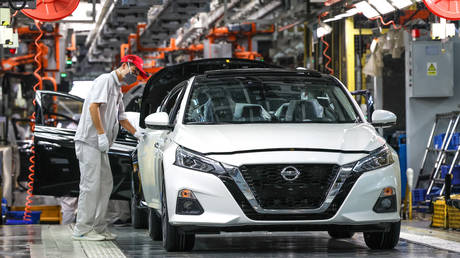Japanese auto giants consider merging to confront China's dominance in EV market, according to reports
Honda and Nissan are said to be considering a merger in response to the rapid growth of China's electric vehicle manufacturing. Read Full Article at RT.com

This potential collaboration between the two automotive giants arises amid challenges faced by traditional manufacturers, particularly due to stiff competition from Chinese electric vehicle (EV) makers and a global demand for EVs that has not met expectations.
Initial reports of the talks surfaced late Tuesday, credited to Nikkei.
In response to these reports, both Honda and Nissan issued identical statements but refrained from sharing specific details or a timeline for a potential agreement.
“As announced in March of this year, Honda and Nissan are exploring various possibilities for future collaboration, leveraging each other’s strengths,” the companies stated on Tuesday. “If there are any updates, we will inform our stakeholders at the appropriate time.”
Honda is considering several options for collaboration, including a merger, a capital tie-up, or the establishment of a new holding company to oversee the merged operations, as noted by Executive Vice President Shinji Aoyama on Wednesday, according to The Japan Times.
Nissan, which was once at the forefront of EV technology, has lagged in recent years as Chinese manufacturers like BYD have outperformed it in technological advancements and cost-effective vehicle production.
Honda, too, is facing pressure after announcing its intention to sell only zero-emission vehicles in major markets like the EU and the US by 2040. However, a lack of consumer demand for EVs, influenced by relatively low fuel prices and insufficient charging infrastructure, has complicated this transition from internal combustion engines.
Should a merger materialize, experts suggest that the combined company would possess the scale necessary to make competitive investments against leading players such as Tesla and BYD.
“Both players stand to gain from this merger,” Vivek Vaidya, senior vice president of mobility at Frost & Sullivan, told Bloomberg on Wednesday. “The combined entity will be a complete automaker.”
There are also indications that Mitsubishi Motors, a third major Japanese manufacturer with existing capital ties to Nissan, may be involved in the discussions.
This strategic maneuvering occurs as various brands confront intensifying competition stemming from the rapid growth of EV production in China, currently the largest automotive market worldwide. The shift in consumer preference in China has favored domestic brands, supported by government incentives to promote the adoption of electric and plug-in hybrid vehicles.
Camille Lefevre for TROIB News
Find more stories on Business, Economy and Finance in TROIB business












